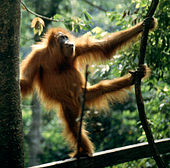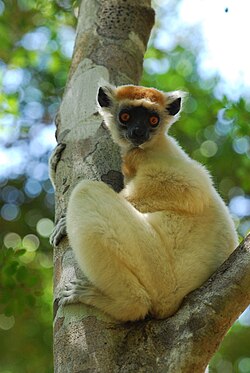The Primates Portal A primate is a member of the biological order Primates, the group that contains lemurs, the aye-aye, lorisids, galagos, tarsiers, monkeys, and apes, with the last category including great apes. With the exception of humans, who inhabit every continent on Earth, most primates live in tropical or subtropical regions of the Americas, Africa and Asia. Primates range in size from the 30-gram (1 oz) pygmy mouse lemur to the 200-kilogram (440 lb) mountain gorilla. According to fossil evidence, the primitive ancestors of primates may have existed in the late Cretaceous period around 65 mya (million years ago), and the oldest known primate is the Late Paleocene Plesiadapis, c. 55–58 mya. Molecular clock studies suggest that the primate branch may be even older, originating in the mid-Cretaceous period around 85 mya. Primates exhibit a wide range of characteristics. Some primates do not live primarily in trees, but all species possess adaptations for climbing trees. Locomotion techniques used include leaping from tree to tree, walking on two or four limbs, knuckle-walking, and swinging between branches of trees (known as brachiation). Primates are characterized by their large brains relative to other mammals. These features are most significant in monkeys and apes, and noticeably less so in lorises and lemurs. Many species are sexually dimorphic, which means males and females have different physical traits, including body mass, canine tooth size, and coloration.
Selected article
The Hoollongapar Gibbon Sanctuary, formerly known as the Gibbon Wildlife Sanctuary or Hollongapar Reserve Forest, is an isolated protected area of evergreen forest located in Assam, India. The sanctuary was officially constituted and renamed in 1997. Set aside initially in 1881, its forests used to extend to the foothills of the Patkai mountain range. Since then, the forest has been fragmented and surrounded by tea gardens and small villages. In the early 1900s, artificial regeneration was used to a develop well-stocked forest, resulting in the site's rich biodiversity. The Hoollongapar Gibbon Sanctuary contains India's only gibbons – the hoolock gibbons, and Northeastern India's only nocturnal primate – the Bengal slow loris. The upper canopy of the forest is dominated by the Hollong tree (Dipterocarpus macrocarpus), while the Nahar (Mesua ferrea) dominates the middle canopy. The lower canopy consists of evergreen shrubs and herbs. The habitat is threatened by illegal logging, encroachment of human settlements, and habitat fragmentation.
Selected picture The mandrill is the world's largest species of monkey. The word mandrill means "man-ape" according to the Oxford English Dictionary. CategoriesSelected species Endangered (IUCN 3.1)|Endangered The golden-crowned sifaka or Tattersall's sifaka (Propithecus tattersalli) is a medium-sized lemur characterized by mostly white fur, prominent furry ears and a golden-orange crown. It is one of the smallest sifakas (genus Propithecus), weighing around 3.5 kg (7.7 lb) and measuring approximately 90 cm (35 in) from head to tail. Like all sifakas, it is a vertical clinger and leaper, and its diet includes mostly seeds and leaves. The golden-crowned sifaka is named after its discoverer, Ian Tattersall, who first spotted the species in 1974. However, it was not formally described until 1988, after a research team led by Elwyn Simons observed and captured them. The golden-crowned sifaka most closely resembles the western forest sifakas of the P. verreauxi group, yet its karyotype suggests a closer relationship with the P. diadema group of eastern forest sifakas. Despite the similarities with both groups, more recent studies of its karyotype support its classification as a distinct species. Did you know?
Primate lists
WikiProjectsThings to do
Associated WikimediaDiscover Wikipedia using portals |
















